The Skinny
Bedtime may be the best time for some, but for others trying to fall asleep is a real chore. Luckily, there’re tricks to help. WellWell previously featured the best practices to implement when waking up, now it’s time to address what to do before going to bed.
The Slate
Have a Consistent Sleep-Wake Cycle
Going to bed and waking up at the same time every day is clearly difficult but attempting to solidify a sleep-wake cycle can be very rewarding. Not only will it improve sleep quality, it will also help temper dependency morning alarms. Additionally, sleeping in on the weekends and taking long naps can throw off the sleep-wake cycles, so it is best to maintain a disciplined sleep schedule for the weekends and reduce naps to power naps, which last anywhere between 15 to 20 minutes.
It may not be part of everyone’s nighttime routine but showering or bathing at night is proven to create better quality sleep. A warm or hot shower and bath helps people fall asleep faster given body temperature tends to drop afterwards. The overall drop improves temperature circadian rhythm and further builds a better sleep cycle.
Generally, it is not encouraged to drink anything prior to bed, given the increased probability of a middle of the night trip to the bathroom. Although drinking water helps prevent dehydration, there is not enough research that show significant benefits to having a glass of water before sleeping. Conversely, tea seems to be the exception. Especially herbal teas are known to be a natural tranquilizer and have served as a route to relaxation for generations.
Blue light exposure can be significantly damaging to sleep cycles. The bottom line is blue light exposure during the night tricks the brain into thinking it’s still daytime, negatively impacting the circadian rhythm in the body and damaging cycles overall. Eventually, blue light “suppresses” melatonin in the body, resulting in feeling less tired and less likely to go to bed consistently.
Whether religious or not, practicing gratitude in a quiet space provides loads of benefits. A bedtime prayer, meditation or simple reflection, aloud or written, boosts self-esteem and helps the body unwind and unload from a hard day’s work. Devoting time to pray or reflecting in other ways, has been proven to be effective in improving mental health and overall well-being. Journaling is also an option for those looking to reflect over the day’s accomplishments and stresses, all of which work toward better quality sleep.
Eyes Up
What’re your late-night practices? Tell us at info@wellwellusa.com











